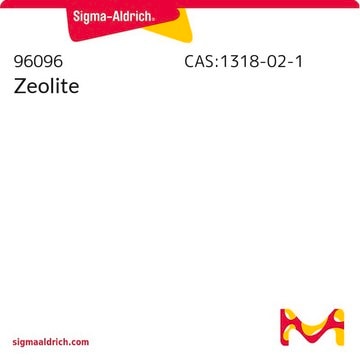562599
Cesium chloride
99.99% trace metals basis
Synonym(s):
Cesium monochloride
Sign Into View Organizational & Contract Pricing
All Photos(3)
About This Item
Linear Formula:
CsCl
CAS Number:
Molecular Weight:
168.36
EC Number:
MDL number:
UNSPSC Code:
12352302
PubChem Substance ID:
NACRES:
NA.23
Recommended Products
Assay
99.99% trace metals basis
form
powder
impurities
≤150.0 ppm Trace Metal Analysis
mp
645 °C (lit.)
SMILES string
[Cl-].[Cs+]
InChI
1S/ClH.Cs/h1H;/q;+1/p-1
InChI key
AIYUHDOJVYHVIT-UHFFFAOYSA-M
Looking for similar products? Visit Product Comparison Guide
Related Categories
General description
Cesium chloride is a white crystalline solid that is soluble in water. It is widely used in the field of solar cells and nucleic acid separation. It is partially soluble in ethanol and methanol but highly soluble in formic acid. Cesium chloride has a wide band gap of about 8.35 eV at 80 K.
Application
Cesium chloride can be used:
- As a precursor to fabricate homogeneous perovskite films with high crystallinity and preferential orientation. These films enhance the power conversion efficiency of solar cells.
- To synthesize blue emission lead-free antimony Cesium halide Qdots of high PLQY of 46% and Mn-Doped Cs2Na1–xAgxBiCl6 double perovskites for engineering the band gap and tailoring the energy transfer.
- To fabricate polyoxometalate electrode materials for Li-ion batteries. The addition of CsCl enhances the thermal stability and cycling stability of the battery cell.
- To prepare a density gradient solution for the separation of nucleic acids.
Signal Word
Warning
Hazard Statements
Precautionary Statements
Hazard Classifications
Repr. 2
Storage Class Code
13 - Non Combustible Solids
WGK
WGK 1
Flash Point(F)
Not applicable
Flash Point(C)
Not applicable
Personal Protective Equipment
dust mask type N95 (US), Eyeshields, Gloves
Certificates of Analysis (COA)
Search for Certificates of Analysis (COA) by entering the products Lot/Batch Number. Lot and Batch Numbers can be found on a product’s label following the words ‘Lot’ or ‘Batch’.
Already Own This Product?
Find documentation for the products that you have recently purchased in the Document Library.
Customers Also Viewed
High Quantum Yield Blue Emission from Lead-Free Inorganic Antimony Halide Perovskite Colloidal Quantum Dots
Jian Zhang, et al.
ACS Nano, 11, 9294-9302 (2017)
Improvements in efficiency and stability of perovskite solar cells using a cesium chloride additive
Xiaodan Tang, et al.
ACS Applied Materials & Interfaces, 14, 26866-26872 (2022)
Homo- and Heterovalent Doping-Mediated Self-Trapped Exciton Emission and Energy Transfer in Mn-Doped Cs2Na1?xAgxBiCl6 Double Perovskites
Bao Ke, et al.
The Journal of Physical Chemistry Letters, 11, 340-348 (2020)
Structure, dynamics, and hydration of POPC/POPS bilayers suspended in NaCl, KCl, and CsCl solutions.
Piotr Jurkiewicz et al.
Biochimica et biophysica acta, 1818(3), 609-616 (2011-12-14)
Effects of alkali metal chlorides on the properties of mixed negatively charged lipid bilayers are experimentally measured and numerically simulated. Addition of 20mol% of negatively charged phosphatidylserine to zwitterionic phosphatidylcholine strengthens adsorption of monovalent cations revealing their specificity, in the
Takafumi Yamamoto et al.
Inorganic chemistry, 50(22), 11787-11794 (2011-10-25)
The rock salt (B1) structure of binary oxides or chalcogenides transforms to the CsCl (B2) structure under high pressure, with critical pressures P(s) depending on the cation to anion size ratio (R(c)/R(a)). We investigated structural changes of A(2)MO(3) (A =
Our team of scientists has experience in all areas of research including Life Science, Material Science, Chemical Synthesis, Chromatography, Analytical and many others.
Contact Technical Service





